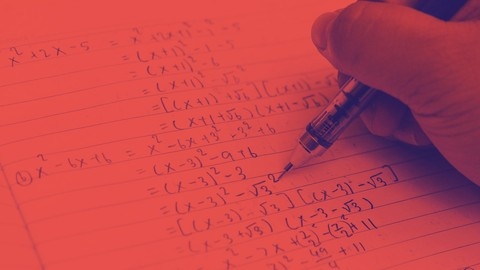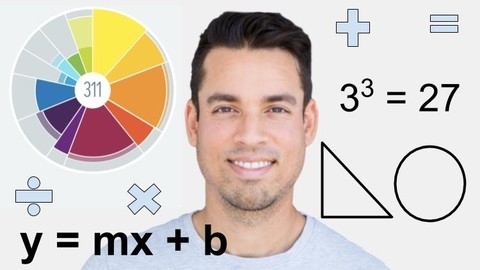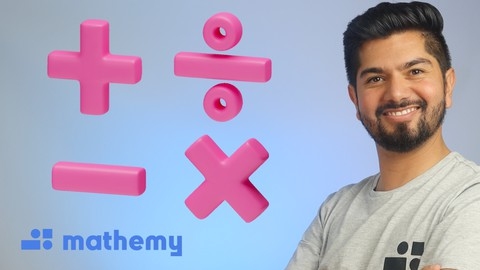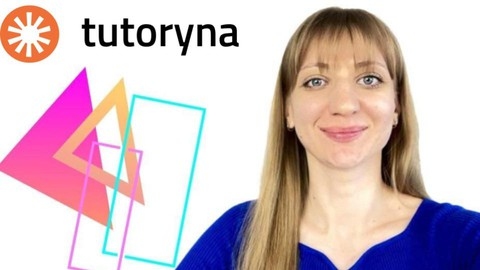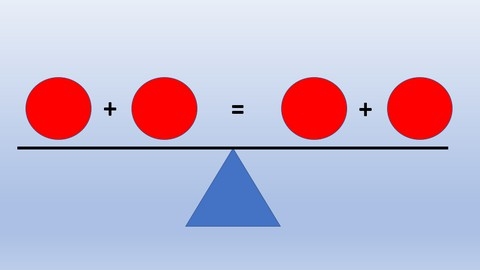Pre-algebra is the foundation for higher-level math courses, providing essential skills in number systems, operations, and problem-solving.
Understanding concepts like fractions, decimals, ratios, and equations will empower you to confidently navigate more complex mathematical topics and excel in various fields requiring analytical thinking.
Finding the right pre-algebra course on Udemy can be a challenge, with so many options available, leaving you wondering which one will best suit your needs and help you grasp these fundamental concepts.
We recommend Pre-Algebra Explained as the best course overall for mastering pre-algebra concepts on Udemy.
This comprehensive program provides in-depth coverage of whole numbers, integers, fractions, decimals, percents, and basic statistics, ensuring a solid understanding of the building blocks of algebra.
The course features step-by-step explanations, interactive quizzes, and plenty of practice problems to reinforce your learning.
While Pre-Algebra Explained is our top pick, we have other exceptional courses to explore.
From mastering pre-algebra concepts with real-world applications to learning with interactive quizzes and calculator skills, we’ve compiled a list of the best Udemy courses to meet your specific learning preferences and goals.
Keep reading to discover the perfect pre-algebra course for you.
Pre-Algebra Explained
You’ll start by learning about whole numbers, including place value, expanded notation, inequalities on the number line, and rounding.
Then, you’ll dive into operations like addition, subtraction, multiplication, and division of whole numbers.
The course covers integers in-depth, teaching you about absolute value, adding, subtracting, multiplying, and dividing integers, as well as exponents with negative bases.
You’ll also learn the order of operations for integers.
Fractions are a major focus, with lessons on divisibility rules, factoring whole numbers, introducing fractions, mixed numbers, finding the greatest common divisor, simplifying fractions, multiplying and dividing fractions, finding the least common multiple, adding and subtracting fractions, comparing fractions, ratios, rates, proportions, operations with mixed numbers, and complex fractions.
Decimals are covered thoroughly, including decimal fractions, comparing and rounding decimals, adding, subtracting, multiplying, and dividing decimals, as well as converting between fractions and decimals.
You’ll also learn about percents.
The course concludes with lessons on mean, median, mode, converting between U.S. units of measurement, and converting between metric units.
A final exam ensures you’ve mastered all the pre-algebra concepts before moving on to algebra.
The optional videos and full solutions provide extra support if needed.
Perfect Your Math Fundamentals (Pre-Algebra)
You will start by learning how to read, write, compare, and order large numbers.
This will help you develop a solid understanding of the number system and how to work with integers, including addition, subtraction, multiplication, and division.
The course then dives into divisibility rules, which are essential for identifying patterns and determining whether a number is divisible by another.
You will learn the divisibility rules for numbers like 2, 3, 4, 5, 6, 7, 8, 9, 10, 11, 13, and even composite numbers like 12, 14, 15, 18, and 63.
Next, you will explore factors and multiples, prime factorization, and the concepts of least common multiple (LCM) and highest common factor (HCF).
These topics are crucial for solving word problems and understanding the relationships between numbers.
The course dedicates a significant portion to fractions, covering classification, conversion between mixed and improper fractions, equivalent fractions, comparing and reducing fractions, and operations like addition, subtraction, multiplication, and division.
You will also learn how to find fractions of whole number quantities or measurements.
Moving on, you will delve into decimal numbers, including expanded form, converting between fractions and decimals, comparing and ordering decimals, and performing operations like addition, subtraction, multiplication, and division with decimals.
The course also covers the order of operations rule (PEMDAS/BODMAS), which is essential for solving complex mathematical expressions correctly.
You will practice problems involving nested parentheses and the BODMAS rule.
Furthermore, you will study rational and irrational numbers, including converting decimals to fractions, representing rational numbers on a number line, and proving the irrationality of numbers like √2 and √11 using the contradiction method.
You will also learn techniques for rationalizing denominators.
Rounding off numbers, approximation, and estimation are other important topics covered in the course.
You will learn various rounding off techniques, approximation methods, and how to estimate using fractions and decimals.
The course also introduces you to scientific notation, covering how to write numbers in scientific notation, convert between scientific notation and ordinary numbers, and perform operations like addition, subtraction, multiplication, and division using scientific notation.
Additionally, you will study percentages, including converting between percentages, fractions, and decimals, expressing one quantity as a percentage of another, and solving word problems involving percentages.
Finally, the course covers ratio and proportion, direct and inverse proportion, profit and loss calculations, discounts, and taxes.
These topics are essential for real-world applications and problem-solving.
Pre-Algebra: A Complete Middle School/High School Curriculum
You’ll start by mastering operations with whole numbers, fractions, decimals, and percents.
The course then dives into expressions, matrices, and various properties that govern mathematical operations.
A significant portion focuses on solving different types of equations, from simple one-step equations to multi-step equations with variables on both sides.
You’ll also learn to work with ratios, rates, and proportions, which have numerous real-world applications.
The course equips you with essential skills for working with formulas, including rearranging them to solve for different variables.
You’ll learn formulas for perimeter, area, simple interest, temperature conversions, and more.
As you progress, you’ll be introduced to the concept of functions, including function notation, operations on functions, and inverse functions.
This lays the groundwork for graphing linear functions, finding slopes, and writing linear equations.
The course also covers graphing systems of equations and inequalities, using methods like substitution and elimination.
In the statistics and probability unit, you’ll learn about measures of central tendency, box-and-whisker plots, theoretical and experimental probability, and odds.
Quickly Master Pre Algebra
In this course, you’ll start with an introduction to real numbers and the number line.
You’ll learn how to compare numbers using greater than, less than, and equal to symbols.
After mastering this concept through a quiz, you’ll dive into operations with integers.
You’ll learn how to add, subtract, multiply, and divide integers, solidifying your understanding with quizzes after each operation.
This will prepare you for working with powers and exponents, as well as the order of operations.
The course covers the order of operations thoroughly, ensuring you can solve complex expressions correctly.
You’ll take a quiz to test your mastery of this crucial concept.
In the next section, you’ll explore factors and multiples, which are fundamental concepts in pre-algebra.
You’ll learn how to identify factors and multiples of numbers, a skill that will be invaluable as you progress in mathematics.
These concepts will be woven into the lessons, allowing you to understand and apply them in context.
ALEKS: Pre Algebra - Video Explanations by Topic
You’ll start by mastering whole numbers, integers, and their operations like addition, subtraction, multiplication, and division.
This includes working with exponents, order of operations, and solving basic equations.
Next, you’ll dive into fractions - adding, subtracting, multiplying, and dividing fractions, as well as converting between fractions, decimals, and percentages.
You’ll learn to simplify fractions and work with mixed numbers too.
The course then moves on to decimals and percents.
You’ll perform operations with decimals, convert between fractions/decimals/percents, and solve real-world percent problems like discounts, taxes, and markups.
Graphing and functions are covered extensively.
You’ll plot points, graph lines using slopes and equations, interpret graphs, and model real-world situations with functions.
Linear equations, inequalities, and systems are also included.
Ratio, proportion, and measurement concepts like unit rates, scale factors, and conversions between units are part of the syllabus.
You’ll apply these to geometry topics like perimeter, area, volume, lines, angles, polygons, and transformations.
Finally, you’ll learn probability basics, data analysis through statistical plots and measures of center, and operations with exponents, polynomials, and radicals like scientific notation and the Pythagorean theorem.
Pre-Algebra Made Easy: Mastering Math Fundamentals
You’ll start by learning how to use the TI-30XS Multiview calculator and its various settings.
Then, you’ll dive into basic operations like addition, subtraction, multiplication, and division with whole numbers.
The course covers important topics like place value, rounding, and estimation.
You’ll learn to solve word problems involving these operations.
It also introduces you to the distributive property and multistep word problems.
Moving on, you’ll explore multiples, factors, least common multiples, and greatest common factors.
This will help you understand concepts like the distance formula and unit rates.
You’ll also learn how to work with ratios, proportions, and scale factors.
A major focus is on fractions and decimals.
You’ll learn to simplify, compare, add, subtract, multiply, and divide fractions and mixed numbers.
The same operations are covered for decimals too.
Converting between fractions, mixed numbers, and decimals is also included.
Percentages are covered in-depth, including solving for percentages, parts, and wholes.
You’ll learn the simple interest formula and how to calculate percent change.
The course then dives into integers - plotting, finding absolute value, adding, subtracting, multiplying, dividing, and comparing them.
You’ll also learn about distance between integers.
Exponents and radicals are explored, including negative exponents, scientific notation, squaring, square roots, cubing, cube roots, and fractional exponents.
The order of operations is reinforced throughout.
With clear explanations, knowledge checks, and practice activities, this course ensures you master the fundamentals before moving to higher-level algebra concepts.
IB Maths Pre-Algebra, FUNDAMENTALS
The course starts with an introduction to fractions, which is a crucial foundation.
You’ll learn how to work with fractions, decimals, and scientific notation - skills that will be invaluable later on.
From there, the course dives into expansion, factorization, and linear equations.
These algebraic concepts may seem daunting, but the course breaks them down step-by-step.
You’ll practice solving linear equations and inequalities, as well as systems of equations.
Geometry is another major component, covering both 2D and 3D shapes.
You’ll learn to calculate areas, volumes, and other geometric properties.
This visual approach helps cement the algebraic concepts.
As you progress, the course tackles more advanced topics like quadratic inequalities, polynomial fractions, and radicals.
Don’t worry - you’ll have plenty of examples and practice problems to reinforce what you’ve learned.
The course includes extra rules and useful tips specifically for succeeding on math exams.
With guidance like this, you’ll approach tests with confidence.
You’ll cover all the prerequisite topics for algebra, from the basics of fractions to complex polynomials.
With diligent practice, you’ll be fully prepared for your next math challenge.
Master Pre-algebra Part 2 of 2
You will start by solidifying your understanding of fractions, including multiplying and dividing fractions, as well as working with mixed numbers.
The course introduces the “Keep, Change, Flip” method and provides a proof for this technique.
Moving on, you will dive into decimals, learning how to perform various operations such as addition, subtraction, multiplication, and division.
The course also teaches you how to convert between fractions and decimals, ensuring a smooth transition between these two representations.
Ratios and rates are essential concepts covered in the course.
You will learn about ratios, equivalent ratios, and how to solve ratio word problems.
Additionally, the course introduces rates, unit rates, and techniques for comparing rates.
Exponents, square roots, and the order of operations are crucial topics that you will explore in depth.
You will gain an understanding of negative bases and exponents, as well as the proper order of operations, including the use of parentheses.
Algebra is a significant component of the course.
You will learn algebra terminology, evaluate expressions, and solve one-step and two-step equations involving addition, subtraction, multiplication, and division.
The course also covers like terms, the distributive property, and how to check solutions to equations.
Translating between English and mathematical expressions is another valuable skill you will develop.
Proportions are introduced, and you will learn how to solve proportions and apply them to word problems.
The course also explores proportional relationships, ensuring a comprehensive understanding of this concept.
Finally, the course delves into percentages, teaching you how to convert between percentages, fractions, and decimals.
You will learn to calculate percentages of numbers and vice versa, providing you with practical skills for real-world applications.
Throughout the course, you will engage with various problem-solving strategies, building your critical thinking abilities and preparing you for more advanced mathematical concepts.
Pre-Algebra Math PART-1 ~ from Zero Knowledge to Advanced
You’ll start by learning the basics of digits and decimals, including decimal operations like addition, subtraction, multiplication, and division.
The course will guide you through rounding decimals, shifting decimal places, and comparing and ordering decimal numbers.
Moving on, you’ll dive into fractions, exploring different types, simplifying fractions, and converting between improper and mixed fractions.
You’ll learn to compare, add, subtract, multiply, and divide fractions, as well as tackle complex fractions and fraction word problems.
The percent section covers converting between percents, decimals, and fractions, calculating percents of numbers and money amounts, percent increase and decrease, discounts, and interest calculations.
You’ll also practice multi-step percent word problems.
The ratios and proportions module introduces you to ratios, equivalent ratios, rates, and three-term ratios.
You’ll learn to identify and solve proportional relationships from tables and equations.
The course covers different types of proportions, including direct, joint, indirect, and combined variation, with practice in writing and solving variation equations.
Throughout the course, you’ll encounter numerous practice questions and review solutions to reinforce your understanding of each concept.
The lectures provide clear explanations, while the question-solving sections allow you to apply what you’ve learned.
You’ll progress step-by-step, building a solid foundation in pre-algebra skills.



